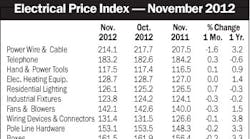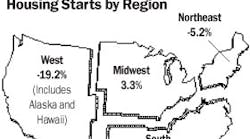Latest from Mag
People - Dec 21, 2012
Obituaries - Dec 21, 2012
November EPI Index Shows No Change
Housing Starts Dip 4% in November
Electrical Marketing - December 21, 2012
Around the Industry - Dec 21, 2012
M&A Investment Advisors See Mergers and Acquisitions in Electrical Market Continuing in Slower Economic Times
Experts in the electrical industry's mergers and acquisitions game see consolidation continuing through economic downturn.
Whether the general financial turmoil of this recession will bring a new wave of consolidation in the electrical distribution channel remains to be seen. People active in advising acquirers and acquirees in the market see signs that point both ways.
“Based on what we know or are involved with we do not foresee any blockbuster transactions in 2009 like Rexel's acquisitions of Gexpro and Hagemeyer, and Sonepar's acquisition of the Hagemeyer U.S. operations,” said Burk Burkhardt, senior managing director, HT Capital Advisors, New York. “However, in our opinion, despite the current tight credit markets and generally difficult economic environment, the level of acquisition activity in terms of number of transactions involving top 200 companies could be greater in 2009 than in 2008 when there were four transactions. Unlike back six-to-seven years ago when they just about totally halted their acquisition activity, the major consolidators seem to be taking a longer term view, and indications are that they continue to seek acquisitions. We also know that the financially strong super-regionals continue to scout for acquisitions.”
On the other hand, Jonathan Skelly of PCE Investment Bankers, Winter Park, Fla., sees acquisition activity slowing down. “The acquisition climate within the electrical market will likely be slower in 2009 than in 2008,” Skelly said. “The first half of the year will be especially slow but then we expect to see better activity in the second half as ‘value’ buyers enter the market and look acquire good companies and very fair valuations. We expect industrial- and commercial-driven wholesalers will be more active while those servicing residential markets will continue to do very few acquisitions.”
The new realities of the battered economy will tip the balance toward a buyer's market, with some exceptions, said our respondents. “It depends on the nature of the selling company, and how important the acquisition would be for a potential acquirer,” Burkhardt said. Some strong distributors with limited exposure to the residential market are still considered “must haves” by consolidators and will still be able to command a premium price, but others will find the market less hospitable, he said.
Skelly sees a similar picture. “Those with either cash on their balance sheet or an available line of credit are in a very attractive position in that they are able to offer sellers a fair deal without contingencies,” Skelly said. “The number of potential buyers in this position is limited so a smaller supply of potential buyers matched against a larger number of potential sellers leads to a buyers' market. This is different from years past where there were multiple potential buyers with access to cheap capital that were competing fiercely for acquisitions, driving higher valuations and providing sellers with many options. Further, certain electrical distributors may find themselves in a weak financial position in 2009 and seeking a sale of the company may be their only option versus shutting down. In this forced position, the power sides with the buyer who is able to offer the struggling seller a lifeline and is thus in a very good negotiating position.”
George Spilka, president of George Spilka and Associates, Allison Park, Pa., sees the buyer's market prevailing early in 2009, but possibly easing after that. “In general, the market during the first half of 2009 will be a buyers' market. This will continue until the economy begins to improve, which I believe should occur by the end of the second quarter of 2009,” Spilka said. “However, I strongly recommend to prospective sellers to remember that the sale of their company is the sale of a long-term asset. Consequently, unless there are unique personal circumstances that mandate a prompt sale, they should not sell their company at a discount price due to the current crisis of confidence in the financial markets. This will pass. And it will pass sooner as opposed to later. Don't be intimidated by the future, I don't expect it to be that bad. I am advising all clients to remain steadfast in their pricing. There are no discounts being given to “bottom fisher” buyers.”
Asked whether they expect an influx of new acquirers into the market, the experts we surveyed all expect private-equity funds to play a diminished role in the short term due to the difficulties of accessing capital. Large regionals such as Border States, Mayer and Schaedler/YESCO to continue benefiting from opportunistic acquisitions, Skelly said.
There are some outside influences that could hasten the sale of some companies over the next year. Among them, access to capital is the most significant. Burkhardt also points to the potential for an increase in the federal capital gains tax. “Our legal and other sources think it is highly unlikely that the new administration will increase the rate in 2009, but will sometime in 2010, when the rate was going to increase to 20 percent if no other action were taken,” Burkhardt said. “So there may be a ‘window’ of 12 months to take advantage of the current low maximum 15 percent capital gains rate, and we believe many owners will do so.”

